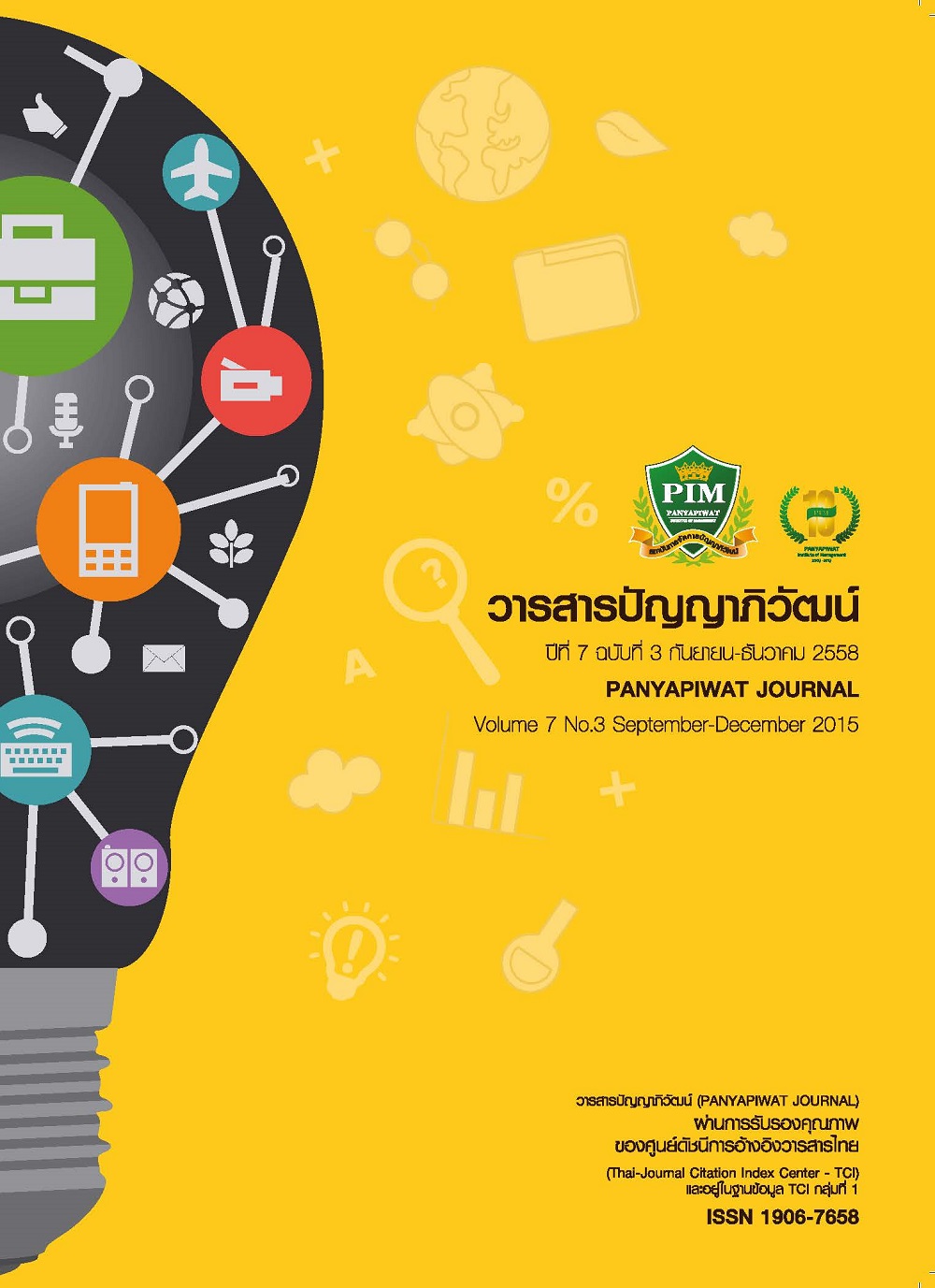ความรับผิดชอบต่อสังคมขององค์กรกับผลกระทบที่มีต่อพฤติกรรมการเป็นสมาชิกองค์กรที่ดีของพนักงาน
Main Article Content
บทคัดย่อ
ความรับผิดชอบต่อสังคมขององค์กร (Corporate Social Responsibility: CSR) เป็นกิจกรรมขององค์กรที่คำนึงถึงผู้มีส่วนได้ส่วนเสีย เพื่อสร้างความยั่งยืนในการดำเนินงานภายใต้หลักการดำเนินงานที่ดีมีจริยธรรม แต่สิ่งที่มีผลกระทบต่อกิจกรรมที่แสดงถึงความรับผิดชอบต่อสังคมขององค์กรนั่นคือ พฤติกรรมของพนักงาน จากการทบทวนวรรณกรรมและงานวิจัย พบว่า การนำ CSR เข้ามาเป็นนโยบายในการปฏิบัติงานขององค์กร มีส่วนช่วยในการกระตุ้นพฤติกรรมในเชิงบวกให้กับพนักงาน อาทิ ความพึงพอใจที่มีต่อองค์กรและการปฏิบัติงาน รวมไปถึงความผูกพันที่มีต่อองค์กร และช่วยลดพฤติกรรมความตั้งใจที่จะลาออกจากงาน นอกจากนี้พบว่า ความผูกพันที่พนักงานมีต่อองค์กรนั้นนำไปสู่การสร้างสมรรถนะที่ดีในการปฏิบัติงานของตัวพนักงาน ดังนั้นองค์กรควรให้ความสำคัญกับพนักงานในการมีส่วนร่วมและเป็นส่วนหนึ่งในการคิด วางแผน และกำหนดแนวทางการดำเนินกิจกรรมด้านความรับผิดชอบต่อสังคมร่วมกัน ปลูกฝังให้เกิดจิตสำนึกและเป็นค่านิยมร่วมในองค์กรเชื่อมโยงไปสู่แนวคิดของการสร้างสรรค์คุณค่าร่วมกันให้สังคม
Corporate social responsibility (CSR) is the activities of organization that take into account of all stakeholders to create sustainable operations under the principles of good ethics. As we have seen that most organizations mainly create activities which respond to the customer, but the effectiveness of corporate social responsibility has been influenced by the employee behavior as well. Literature reviews have found that adopting of CSR can help to motivate the employee behavior in positive way, such as satisfaction and commitment towards the organization. Moreover, CSR can reduce the employee turnover intention, it also found that employee commitment lead to an increase in performance. So Organization should encourage employee to be a part of corporate social responsibility activities and finally become to be a share value in the organization and link to a creating share value.
Article Details
“ข้าพเจ้าและผู้เขียนร่วม (ถ้ามี) ขอรับรองว่า บทความที่เสนอมานี้ยังไม่เคยได้รับการตีพิมพ์และไม่ได้อยู่ระหว่างกระบวนการพิจารณาลงตีพิมพ์ในวารสารหรือแหล่งเผยแพร่อื่นใด ข้าพเจ้าและผู้เขียนร่วมยอมรับหลักเกณฑ์การพิจารณาต้นฉบับ ทั้งยินยอมให้กองบรรณาธิการมีสิทธิ์พิจารณาและตรวจแก้ต้นฉบับได้ตามที่เห็นสมควร พร้อมนี้ขอมอบลิขสิทธิ์บทความที่ได้รับการตีพิมพ์ให้แก่สถาบันการจัดการปัญญาภิวัฒน์หากมีการฟ้องร้องเรื่องการละเมิดลิขสิทธิ์เกี่ยวกับภาพ กราฟ ข้อความส่วนใดส่วนหนึ่งและ/หรือข้อคิดเห็นที่ปรากฏในบทความข้าพเจ้าและผู้เขียนร่วมยินยอมรับผิดชอบแต่เพียงฝ่ายเดียว”
References
ตลาดหลักทรัพย์แห่งประเทศไทย. (2556). ความรับผิดชอบต่อสังคมเพื่อความยั่งยืนขององค์กร. สถาบันธุรกิจเพื่อสังคม.
สถาบันไทยพัฒน์. (2555). Thai Corporate Social Responsibility: ซีเอสอาร์คืออะไร. สืบค้นเมื่อ 6 ตุลาคม 2557970 http://www.thaicsr.com/2006/03/blog-post_20.html
สถาบันธุรกิจเพื่อสังคม. (2553). CSRI Thai - นิยาม ความหมายของ CSR. สืบค้นเมื่อ 6 ตุลาคม 2557, จาก http://thaiproserver.com/csri/index
โสภณ พรโชคชัย. (2551). CSR ที่กําลังเป็นการโฆษณาชวนเชื่อ. สืบค้นเมื่อ 6 ตุลาคม 2557, จาก www.thaiappraisal.
org/thai/market
Albdour, A. A. & Altarawneh, I. 1. (2012). Corporate Social Responsibility and Employee Engagement in Jordan. International Journal of Business and Management, 7(16), 89-105.
Carroll, A. B. & Buchholtz, A. K. (2006). Business & society: ethics and stakeholder management. Mason, Ohio [u.a.]: Thomson/South-Western.
Elkington, J. (2004). Enter the triple bottom line. The Triple Bottom Line: Does It All Add up, 1-16.
Galbreath, J. (2010). How does corporate social responsibility benefit firms?. European Business Review, 22(4), 411-431.
Gunder, M. (2007). Sustainability: Planning's Redemption or Curse?. Retrieved September 9, 2014, from http://www.planetizen.com/node/22812
Hansen, S. D., Dunford, B. B., Boss, A. D., Boss, R. W. & Angermeier, I. (2011). Corporate Social Responsibility and the Benefits of Employee Trust: A Cross-Disciplinary Perspective. Journal of Business Ethics, 102(1), 29-45.
ISO - International Organization for Standardization. (n.d.). Retrieved October 6, 2014, from http://www.iso.org/iso/home.html
Jong, D. J. de. (2011). International transfer of employee-oriented CSR practices by multinational SMEs. International Journal of Workplace Health Management, 4(2), 123-139.
Lee, E. M., Park, S. Y. & Lee, H. J. (2013). Employee perception of CSR activities: Its antecedents and consequences. Journal of Business Research, 66(10), 1716-1724.
Lee, Y. K., Kim, Y. “Sally,” Lee, K. H. & Li, D. (2012). The impact of CSR on relationship quality and relationship outcomes: A perspective of service employees. International Journal of Hospitality Management, 31(3), 745-756.
The Stock Exchange of Thailand: Your Investment Resource for Thailand's Capital Market. (n.d.).Retrieved October 6, 2014, from http://www.set.or.th/th/index.html
UNIDO. (n.d.). Corporate social responsibility for market integration. Retrieved March 3, 2014, from http://www.unido.org/csr.html
Vlachos, P. A., Panagopoulos, N. G. & Rapp, A. A. (2013). Feeling Good by Doing Good: Employee CSR-Induced Attributions, Job Satisfaction, and the Role of Charismatic Leadership. Journal of Business Ethics, 118(3), 577-588.
WBCSD - World Business Council for Sustainable Development. (n.d.). Retrieved March 3, 2014, from http://www.wbcsd.org/work-program/business-role/previous-work/corporate-socialresponsibility.aspx
Translate Thai References
Corporate Social Responsibility Institute. (2010). Definition of Corporate Social Responsibility. Retrieved October 6, 2014, from http://thaiproserver.com/csri/index [in Thai]
Phornchokchai, S. (2008). CSR and propaganda. Retrieved October 6, 2014, from www.thaiappraisal.org/thai/market [in Thai]
Thaipat Institute. (2012). What is Thai Corporate Social Responsibility?. Retrieved October 6, 2014, from http://www.thaicsr.com/2006/03/blog-post 20.html [in Thai]
The Stock Exchange of Thailand. (2013). Corporate Social Responsibility for sustainable of the organization. Social Responsibility Center. [in Thai]

